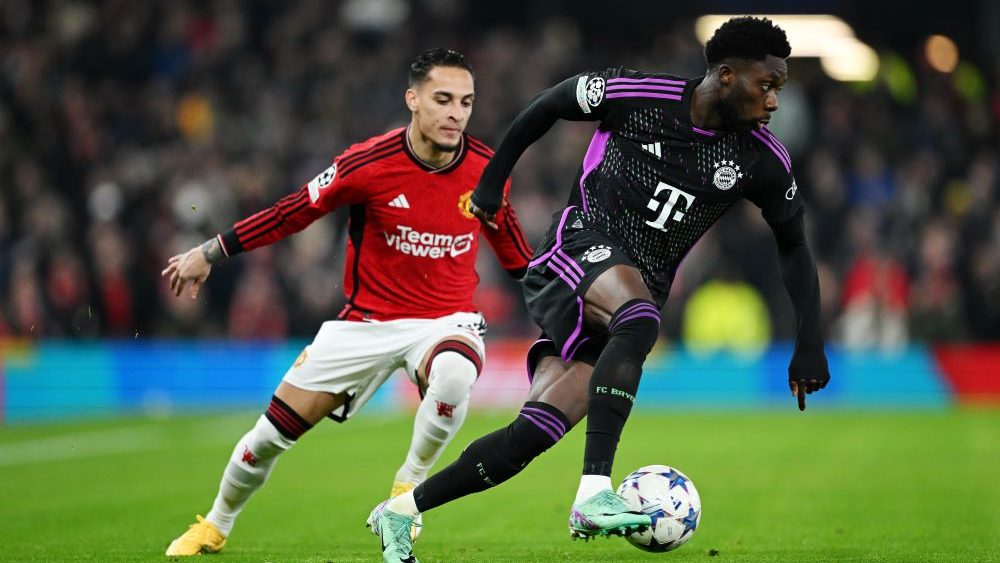The Future of Alphonso Davies
The Davies Conundrum
Davies’ rise to stardom in the 2020 season was meteoric in nature. He went seemingly overnight from being a fringe player who had tons of physical ability but lacking in specific skills to an indispensable part of the squad.
His demolition of Barcelona’s entire defense setting up Kimmich’s goal in the Quarterfinals of that year’s Champions League will always be a fixture in any highlight reel for his career.
He thrived under Hansi Flick and the tutelage of David Alaba, making massive strides in his tactical understanding, on ball skills and positioning while allowing him to use his natural speed to decimate opponents in attack. Moreover, that speed has always allowed him a little more room for error defensively where he is weaker but can catch nearly any player in the world.
However, since Flick and Alaba’s departure, his growth has slowed and his performances often fluctuate somewhere between poor and very good. While most people have seemingly put the blame for Davies’ stuttering development solely on him, which is not entirely unfair, that is only one part of the problem.
Finding His Place
One of the biggest problems Davies has faced since Flick’s departure is how the two succeeding managers have viewed that position, the responsibilities they expect from it and the general tactical philosophy they have employed.
Nagelsmann
While you would assume that Nagelsmanns’ tactics would suit Davies, being so attacking, that was not always the case. Nagelsmann put a lot of pressure on all of his defenders in part due to the high line and the license of nearly every player to advance as necessary.
In theory that would be fine, and was, when players were moving in tandem. However, as soon as any of the other players did not adjust to cover one of the defenders getting forward, things tended to get ugly quickly when they lost the ball.
Davies, being the most attacking of the defenders, was often very high up the pitch with almost no chance of tracking back despite his speed when these situations occurred. However, even when he was in a position to track back, often he would be left with a 1v1 defensive duty which is not the strongest part of his game.
Worse still, with no striker last season and a lot of uncertainty in the attack, Davies struggled to find a way to contribute consistently to the offense with no central figure for his crosses and inconsistent spacing and movements from the wingers.
But perhaps the most detrimental tactical switch was moving away from the hyper counterpressing that Flick employed. While Nagelsmann’s system put pressure on the ball, it did not employ the same degree of intensity and focus that Flick did which resulted in far fewer situations and chances for Davies to showcase his best abilities.
Tuchel
Since Tuchel’s arrival, things have only gotten worse. Tuchel counterpresses far less often than Nagelsmann even did and his slower, more methodical approach to the game really does not suit Davies’ abilities.
Davies is at his best when he has room to run, quickly counter or space to drive down the pitch. He needs a winger who he can overlap and play 1-2’s around the box with, and a central figure whom he can provide service to.
Tuchel’s system is much more about stability and deliberate play than high pressure and lightning quick (counter)attacks. It tends to see the defenders sit deeper and the build up play develop slower, relying on his attacking players to create chances far more often than the defenders.
To that end, Tuchel seems to prefer a more traditional defensive player in that position rather than the hybrid offensively inclined defender that Davies is.
So despite Bayern having acquired that central attacking figure this season, Davies has still found it difficult to play at his best given that Tuchel’s tactics do not often provide the space or opportunity for the fullbacks to run at defenses the way he would like.
Next year?
So what does all of this mean going forward? That’s a tough question to answer. On paper it is clearly difficult to commit the type of money that Davies is supposedly after to extend his contract, assuming he is even willing to, given his inconsistent play over recent seasons.
More importantly, Bayern need to have a clear idea of whom they realistically expect to be managing this team over the coming years. If that person is Tuchel in their minds, then selling Davies probably makes the most sense while they can still get a high price for him.
If that person is not Tuchel, then they need to examine whether they believe that Davies style of play and strengths would actually fit under their preferred coaching options.
Davies, for all of his shortcomings, is still the type of player that can change a game instantly. His speed and ability on the ball is unique. He is also a seemingly popular figure in the dressing room.
Those types of players are hard to come by and I think we only need to look at the other fullback position to realize just how hard it can be to find the quality of player and talent that is expected at Bayern in these positions.
So while his consistency and play has often frustrated fans over recent seasons, Bayern still need to be sure of their path before they move on from Davies. There is no heir apparent at Bayern currently and finding a comparable replacement will almost certainly be a more difficult task than many people may think.








[…] Source […]